My father died of car crash injuries when I was fifteen in 1954. Now I am eighty-three. Despite our few shared years, he remains the person most influential in my life. I think of him often, and with gratitude, and wonder at how he inspired me.
My father, born in 1897, lived through repeating hard times. Born and reared the son of a livestock dealer-farmer who conducted business largely on horseback through my father’s youth when he apprenticed, my father was drafted for Army service in World War One and completed Officer Candidate School at Camp Zackary Taylor in Kentucky just in time for the Armistice.
Returning home to Virginia’s mountains, he then pursued farming in partnership with Sidney Sheltman, Montgomery County’s supposedly richest man, a political operator who owned a Ford dealership, several sawmills, timberlands and farms and was Christiansburg’s postmaster. Together they bought in 1919 a 777 acre farm as 50-50 partners for $30 an acre, all but $1000 on a 5 year promissory note. My father was to be managing partner, Sheltman the silent partner.
In 1920 the farming economy collapsed, going from its best year in history (1919, thanks to Europe’s vast needs due to World War One) to its worst decade, due to European recovery and the resulting decade-long fall of farm commodity and land prices. Sheltman soon died of influenza and in a week all his ventures were in receivership, including the 777 acre farm. Turned out Sheltman was not the county’s richest man, just its most leveraged, and as a result insolvent.
The seller of the 777 acre farm exercised his vendor’s lien and bought it back in the receivership for a third of the price my father and Sheltman had agreed to pay for it. Blessedly the seller declined to pursue my father for the deficiency, likely judging him a bloodless turnip, as Sheltman had proved to be.
My father then pursued life insurance sales as a career and moved to Birmingham, Alabama, Pittsburg of the South. There he met my mother and they married in 1925 and moved to Bradenton, Florida, enjoying the first Florida Land Boom. My father did well, earning almost $4000 in insurance commissions in 1926 and paying $3.96 in Federal Income Tax. Then the Land Boom became a Bubble that burst and my parents found themselves back in Christiansburg with their first child, Mary Ann, born February 5, 1929, and my father without a job and the Crash and Great Depression looming.
At his death in 1954 he was a successful self-educated lawyer with a solo small-town general practice centered on income tax return preparation, real estate and chancery work. He had acquired his law license in 1934 after “reading” law under a judge, prepared only by high school. He’d studied law while serving as Clerk of Montgomery County Circuit Court, having been appointed to that elective office to replace the elected Clerk who died in office in 1931. His pay as Clerk was $700 per year.
When in 1936 he ran for Clerk my father lost, swept from office by Republican, Baptist and Bootlegger voters angered by his ticket-mate Franklin Roosevelt’s repeal of Prohibition. Left jobless, he hung out his shingle in Christiansburg and slowly built a practice through the last years of the Great Depression, the Second World War and the Korean War.
In addition to a law practice, he operated a hilly 130-acre sheep, beef, pasture and hay farm where we moved in 1952 when materials for my parent’s long delayed dream house atop a high hill there finally became available. The hill offered uninterrupted views of the mountain tops of five counties (Montgomery, Floyd, Pulaski, Giles and Roanoke). The farm was surrounded by other small farms, mostly dairies. The farm had been the love of my father’s life from my earliest memory, and he transferred that love to me. If you would like to see the farm and it’s history on a drone video, Word Farm Riner Virginia
After his death my mother and I operated the farm through my remaining high school, college (I was a commuting day student at nearby Virginia Tech) and law school years. In 1960 we sold the live stock and rented the farmland to a neighboring dairyman. In 1961 I commenced practicing law in Richmond where I still practice. My mother and sister Mary Ann lived on on the farm until mother’s death in 1999 at age 98.
Meanwhile, my sister Mary Ann had become a lawyer in 1980 by “reading” law and taking the bar exam successfully, as our father had done. She too had a successful solo practice in Christiansburg, capped by long service as Commissioner of Accounts. She moved from the farm to Christiansburg a few years after our mother’s death and now lives in Abingdon where her son Jack for ten years headed The Crooked Road, Virginia’s 501 (c) (3) non-profit supporting mountain music for economic development.
How was my father so influential in my life? As their third child, born when he was 41 and my mother 37, my parents treated me as a fellow adult from my earliest memory. My father’s law practice and farming duties did not allow long vacations, but weekends were often spent on shared auto trips to agrarian destinations, like visits to Morlunda Farm in Greenbrier County, West Virginia, home of the Domino strain of Hereford cattle, the West Virginia and Pennsylvania State Fairs, and the Amish farming country of Lancaster County, Pennsylvania.
Every week day before dark my father left his law office in time to pick me up, visit the farm and inspect the stock. On Sunday afternoons, he and his fellow farmer friend Jack Atkinson salted their stock. I joined them, opening gates and calling the pastured cattle and sheep to come to the salt we poured out in small piles on hilltops where my father had driven us.
“Call them, Mr. Tom,” Mr. Atkinson would say, and I would respond at the top of my lungs, “Coo sheep, coo sheep, coo…Soo calf soo, soo calfie soo, (repeating).” This weekly ritual began when I was four.
Soon the herd and flock would run to us, gathering speed as they neared the craved salt. Then we would count and inspect them, looking for signs of injury or illness and at their states of hardiness as they licked the salt hungrily. My father and Mr. Atkinson discussed the lambs and calves and their development critically, complimenting the good milkers among the mothers.
Hay making in my childhood was thrilling. My father mowed our 40 acres of Alfalfa with our team of Belgian mares, Maud and Bird, with me sitting on his lap, my hands clutching the lines inside his hands. I can hear the cutter bar and Pittman rod’s chatter, smell the heady aroma of the sweating mares. I can also hear Maud and Bird in their barn stalls at lunch break, their teeth noisily stripping rows of corn kernels off ears placed in boxes nailed in the stalls corners.
Next day I was back on my father’s lap as he drove the team pulling a side delivery rake to windrow the alfalfa. He then backed the Doodle Bug with buck rake down the windrows, collecting the loose hay on the long wood tines and hauling it to be stacked on the field edge. (The Doodle Bug was a modified Model A truck with cab and bed removed. I sat on the driver’s bench seat beside him).
All this changed on my 12th birthday, June 29, 1950, when my father retired Maud and Bird and the Doodle Bug and bought a John Deere MT tractor on condition the dealer teach me to operate it. After that , I mowed and raked the hay, a neighbor custom baled it, and I hauled the bales to our barn on a tractor-pulled trailer custom built from an old two-ton truck frame. With help from classmates, I hefted the bales into the barn loft.
Through my high school, college and law school summers, making hay thus was my summer vocation, and I loved it. Surplus hay was a cash crop for us, $1 to $1.50 a bale, but most of it I fed to our twenty beef cows and their calves and sixty ewes and their lambs through the winters and early springs. From my father’s death until I finished law school I was the farmer, with day-labor help from friends my age and a retired dairy farm manager-neighbor. It was an experience I still treasure.
Until shortly before I finished my three years of college, I hoped to make farming my career, but then I realized I could not make an adequate living at it and decided to go to law school. I applied for admission at University of Richmond and was admitted and awarded a Williams Scholarship of $1400 annually that covered the $1000 annual tuition plus enough left over for room rent. My day-student tuition at Virginia Tech had been only $66 a quarter or $198 a year for two years (I had attended Hamden-Sydney College my freshman year for $1000 including tuition, room, board and laundry. That was paid from a bequest from my paternal Uncle Bob’s widow. (What a bargain my education was then compared to costs now).
My first job had been sweeping my father’s law office and burning his trash plus watering his office flower bed after school, this from fifth grade up for 50 cents a week. Farm chores like picking raspberries and garden vegetables plus hay making occupied my summers. After we moved to the farm at my age twelve I added feeding the stock before and after classes to my chores. A perfect upbringing for a boy.
My father had a great sense of humor. He admired good farmers and disliked those who abused their land. He loved to experiment on the farm and was sometimes misguided by the USDA, as when it recommended planting multiflora rose fences (birds spread the seeds and soon bushes of the pesky plants sprouted all over our and neighbors’ farms).
Thanksgiving weekend 1950 brought us The Great Appalachian Storm, a Nor’easter non-tropical cyclone that killed 383 humans and deposited 57 inches of snow in nearby Pickens, West Virginia and three drifting feet on us. It made a profound impression on me, and foretold my father’s death, as I have written elsewhere.
You can read about The Great Appalachian Storm on Wikipedia.
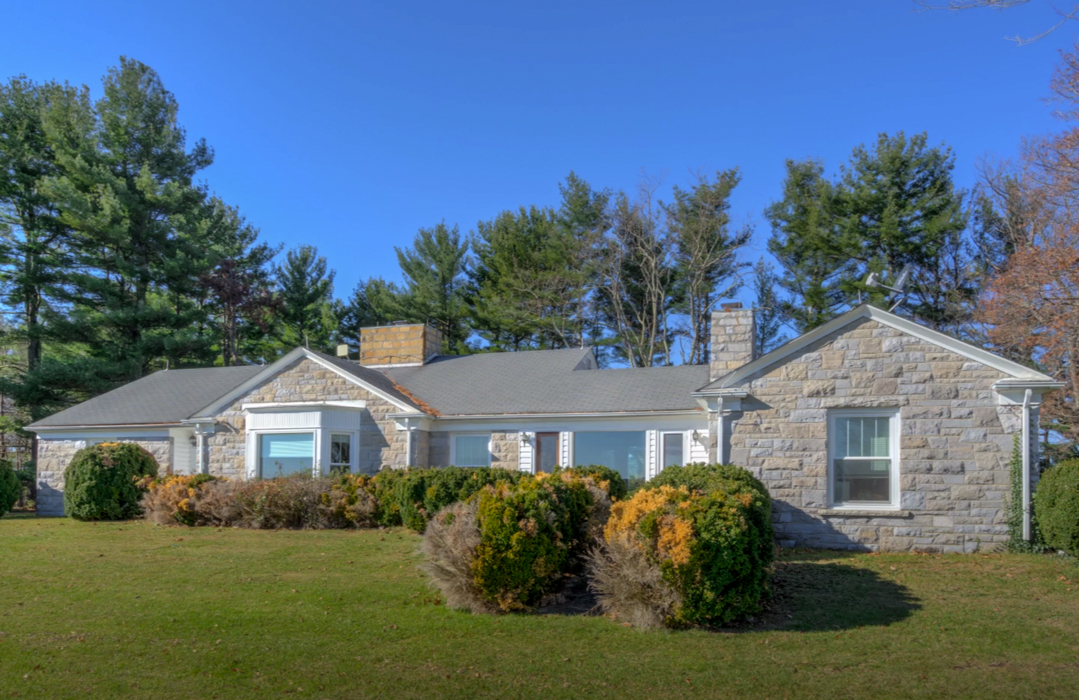
My parents’ dream house atop the hill with views of five counties. Built from stone from Indian fighting Fort McDonald.
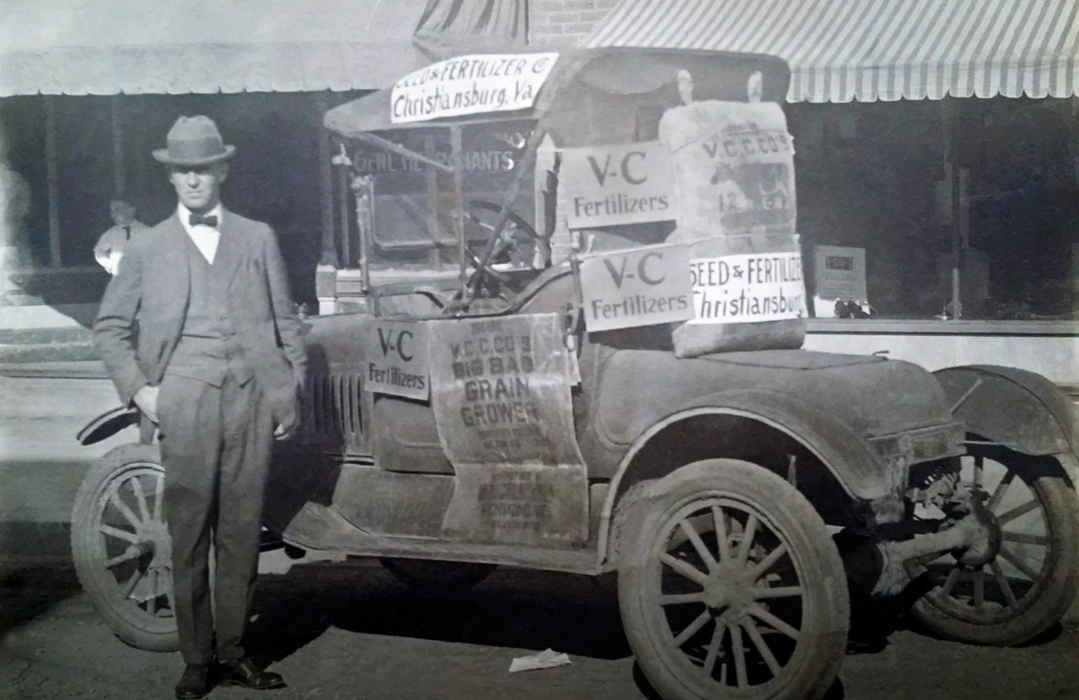
My father Jack Word selling fertilizer circa 1923.
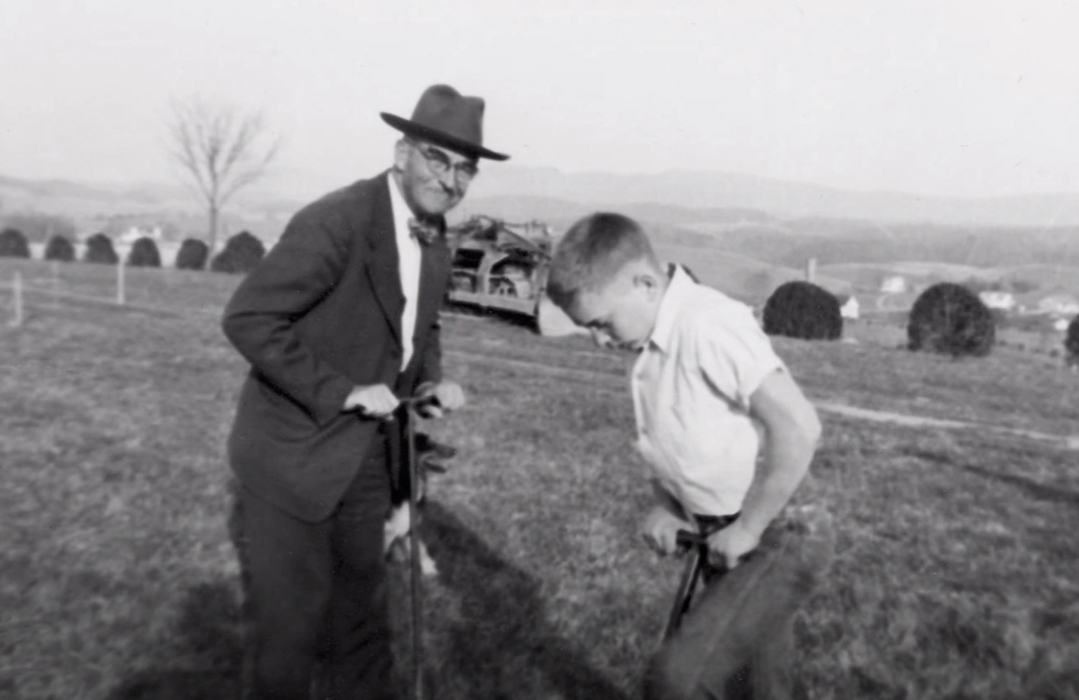
My father and I digging to lay dream house keystone 1951, looking south to Floyd County.
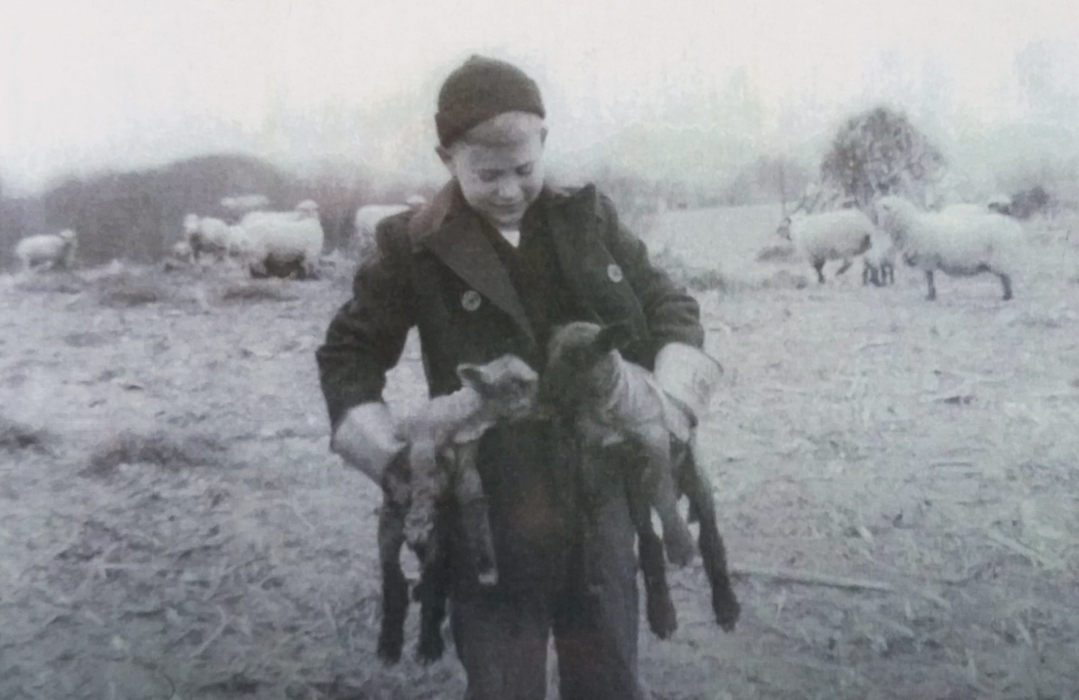
Me with newborn twin lambs, 1950.
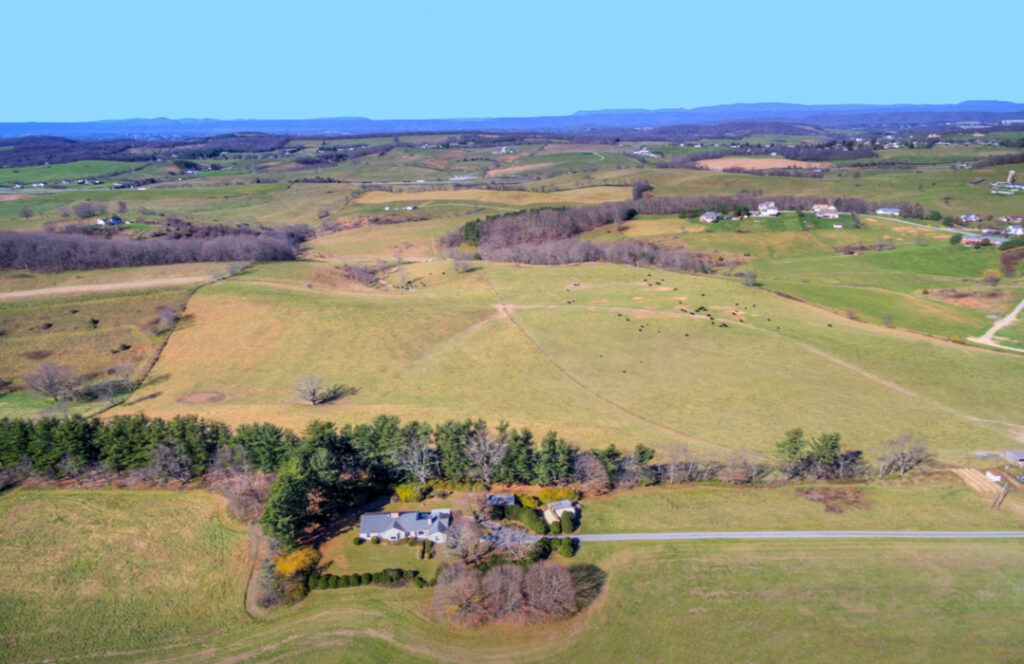
Loved reading this and watching the drone video!
Tom,
I would like to contact you regarding the Word Family History in Virginia.
Martha Word Haley
Wonderful story Tom.